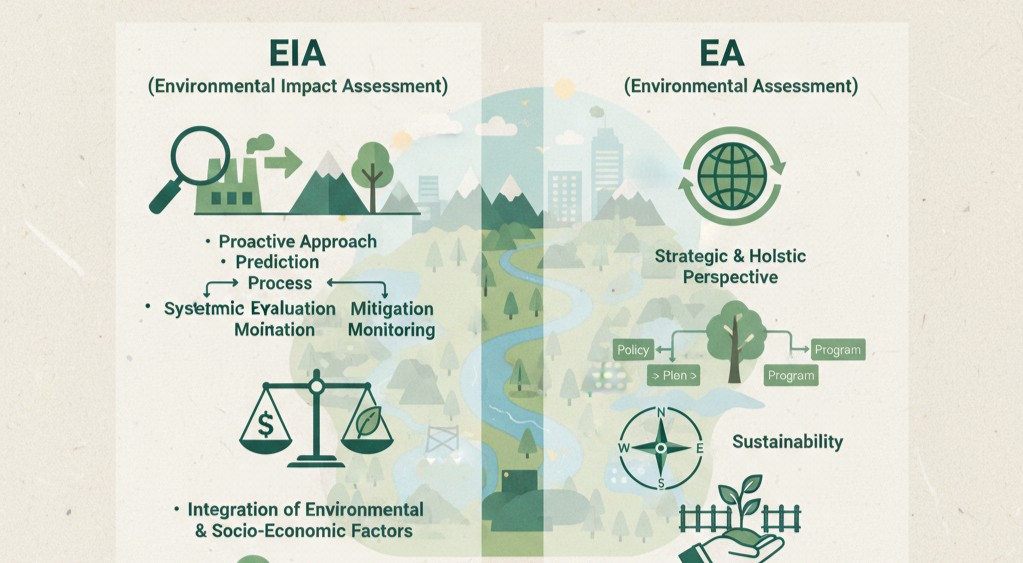
This specialized training course is designed to provide a comprehensive understanding of the core environmental principles and concepts that form the scientific and ethical foundation for both Environmental Impact Assessment (EIA) and Environmental Audit (EA). The course goes beyond procedural knowledge to instill a deeper appreciation for the 'why' behind environmental management, enabling participants to make more informed and robust decisions. It is essential for anyone who needs to not only follow a process but also understand the underlying ecological and societal rationale.
The curriculum is structured to build a strong theoretical foundation, starting with the bedrock principles of environmental law and sustainability before moving into more specific topics. It covers the intricacies of ecosystems and biodiversity, the challenges of climate change and pollution, and the strategic importance of resource management. The course also addresses critical concepts like social and health impacts, the principles of a circular economy, and the practical application of environmental risk assessment and valuation.
Who should attend the training
Objectives of the training
Personal benefits
Organizational benefits
Training methodology
Trainer Experience
Our trainers are seasoned professionals with extensive experience in environmental management and policy. They have a strong academic background and practical experience in applying environmental principles to real-world projects. Their hands-on expertise ensures that the training is not only informative but also highly relevant and applicable to real-world scenarios.
Quality statement
We are dedicated to providing high-quality, impactful training that adheres to the highest professional standards. Our courses are continually reviewed and updated to incorporate the latest developments and best practices in the environmental field.
Tailor-made courses
We offer customized training solutions tailored to the specific needs of your organization. We can design a program with a focus on a particular industry, a specific country's regulations, or a combination of topics to meet your unique requirements.
Course Duration: 5 days
Training fee: USD 1300
Module 1: Foundational Environmental Principles
Module 2: Ecosystems and Biodiversity
Module 3: Climate Change
Module 4: Pollution and Contaminant Pathways
Module 5: Resource Management
Module 6: Social and Health Principles
Module 7: Circular Economy and Waste
Module 8: Environmental Risk Assessment
Module 9: Environmental Valuation
Module 10: Environmental Management Systems (EMS)
Requirements:
· Participants should be reasonably proficient in English.
· Applicants must live up to Armstrong Global Institute admission criteria.
Terms and Conditions
1. Discounts: Organizations sponsoring Four Participants will have the 5th attend Free
2. What is catered for by the Course Fees: Fees cater for all requirements for the training – Learning materials, Lunches, Teas, Snacks and Certification. All participants will additionally cater for their travel and accommodation expenses, visa application, insurance, and other personal expenses.
3. Certificate Awarded: Participants are awarded Certificates of Participation at the end of the training.
4. The program content shown here is for guidance purposes only. Our continuous course improvement process may lead to changes in topics and course structure.
5. Approval of Course: Our Programs are NITA Approved. Participating organizations can therefore claim reimbursement on fees paid in accordance with NITA Rules.
Booking for Training
Simply send an email to the Training Officer on training@armstrongglobalinstitute.com and we will send you a registration form. We advise you to book early to avoid missing a seat to this training.
Or call us on +254720272325 / +254725012095 / +254724452588
Payment Options
We provide 3 payment options, choose one for your convenience, and kindly make payments at least 5 days before the Training start date to reserve your seat:
1. Groups of 5 People and Above – Cheque Payments to: Armstrong Global Training & Development Center Limited should be paid in advance, 5 days to the training.
2. Invoice: We can send a bill directly to you or your company.
3. Deposit directly into Bank Account (Account details provided upon request)
Cancellation Policy
1. Payment for all courses includes a registration fee, which is non-refundable, and equals 15% of the total sum of the course fee.
2. Participants may cancel attendance 14 days or more prior to the training commencement date.
3. No refunds will be made 14 days or less before the training commencement date. However, participants who are unable to attend may opt to attend a similar training course at a later date or send a substitute participant provided the participation criteria have been met.
Tailor Made Courses
This training course can also be customized for your institution upon request for a minimum of 5 participants. You can have it conducted at our Training Centre or at a convenient location. For further inquiries, please contact us on Tel: +254720272325 / +254725012095 / +254724452588 or Email training@armstrongglobalinstitute.com
Accommodation and Airport Transfer
Accommodation and Airport Transfer is arranged upon request and at extra cost. For reservations contact the Training Officer on Email: training@armstrongglobalinstitute.com or on Tel: +254720272325 / +254725012095 / +254724452588
| Course Dates | Venue | Fees | Enroll |
|---|

Armstrong Global Institute
Typically replies in minutes